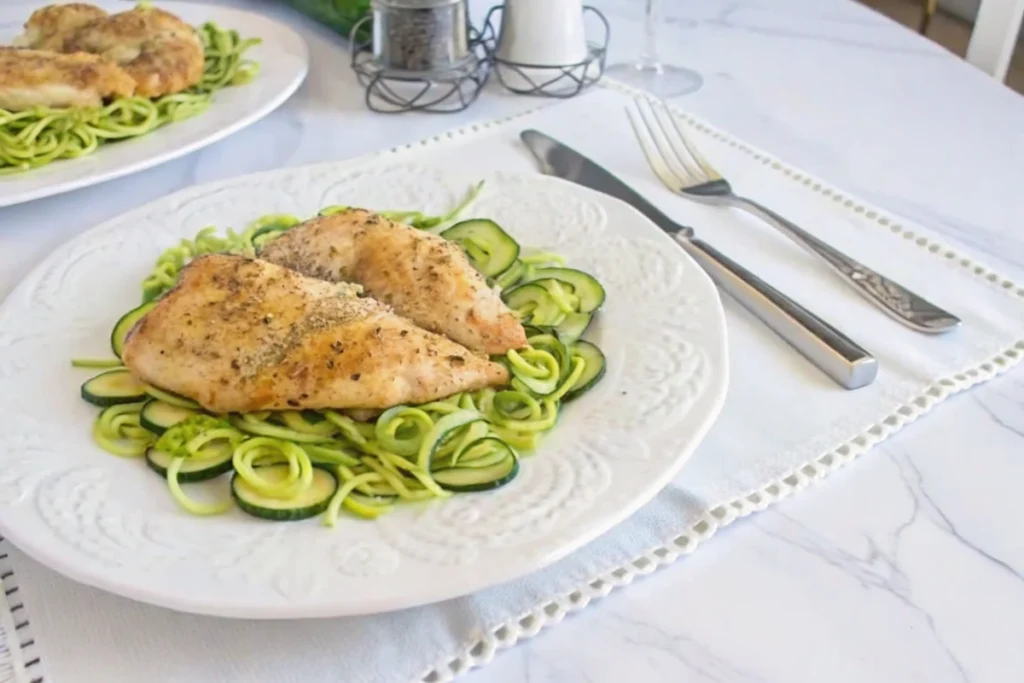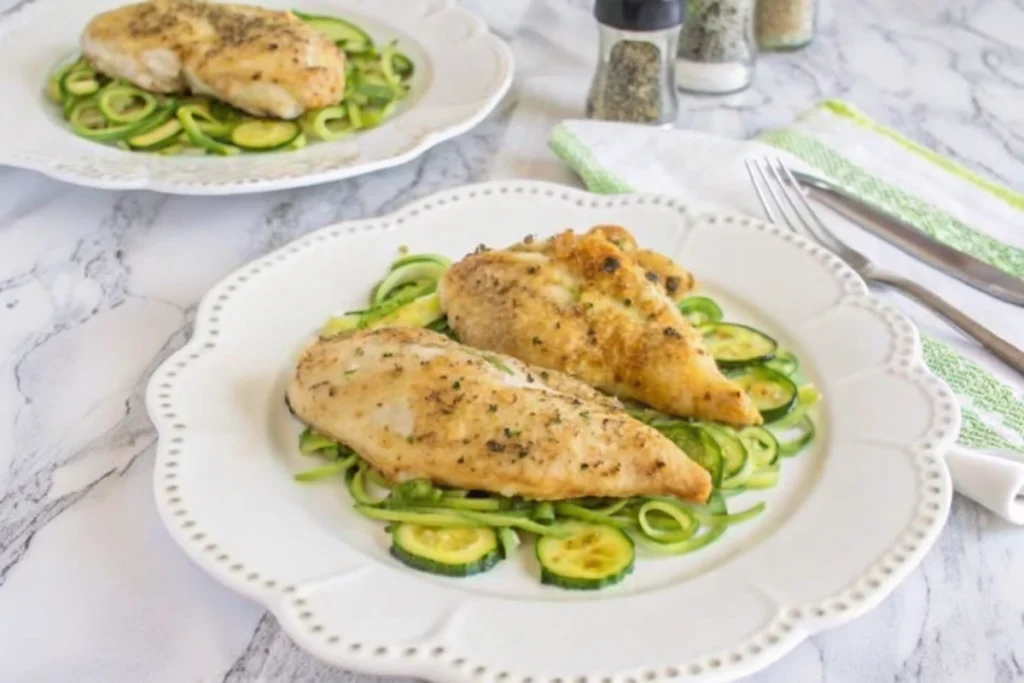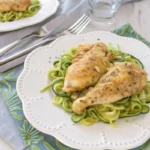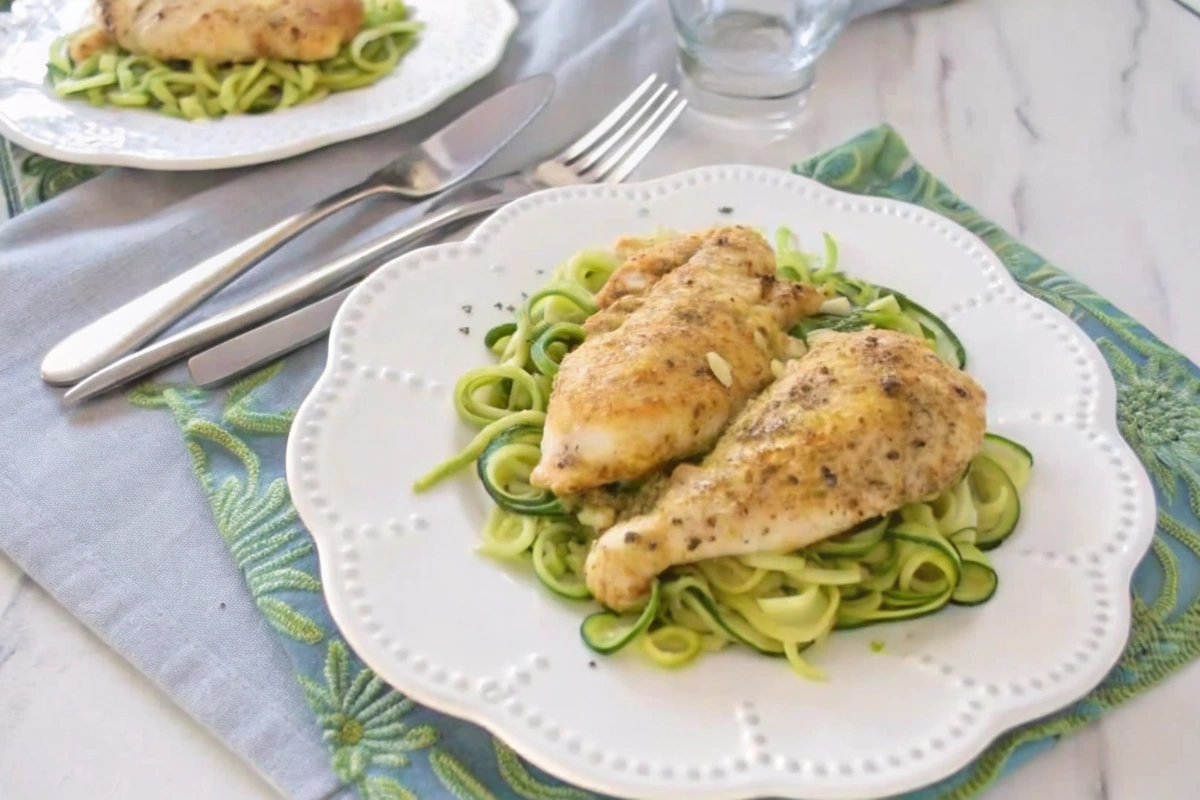Table of Contents: Oven Baked Boneless Skinless Chicken Breast
Oven Baked Boneless Skinless Chicken Breast
Introduction: Oven Baked Boneless Skinless Chicken Breast
If you’ve ever ended up with dry, rubbery chicken from the oven, you’re not alone. But here’s the truth: oven baked boneless skinless chicken breast can be juicy, flavorful, and downright crave-worthy—if you do it right. This guide is built for home cooks who want to master this staple with confidence and ease. We’ll cover everything from temperature tips (350°F vs 400°F), prep hacks to keep chicken moist, the science behind baking times, and even delicious flavor combos for next-level meals.
Looking for inspiration? Try this easy high-protein dinner recipe that pairs perfectly with oven baked chicken breast.
Why Oven Baked Boneless Skinless Chicken Breast Is a Weeknight Hero
The Popularity of Oven Baking Boneless Skinless Chicken
Boneless, skinless chicken breasts have become a go-to choice in American kitchens—and it’s not hard to see why. They’re lean, versatile, and cook quickly. Baking them in the oven is especially popular because it’s a hands-off method that allows you to cook large batches with minimal cleanup.
This method also gives consistent results. Unlike pan-frying, which can lead to uneven cooking or dryness, oven baking provides a steady temperature that can be fine-tuned for moist, tender chicken every time.
Health Benefits of Skinless Boneless Chicken Breast
From meal preppers to calorie-counters, this cut of chicken is a top pick for a reason. It’s low in fat and high in protein, making it ideal for those on heart-healthy, weight-loss, or high-protein diets. Oven baking helps preserve these benefits by requiring no added oil or butter. You get a clean, healthy protein source without sacrificing flavor or texture.
Here’s a quick comparison chart for different cooking methods:
| Cooking Method | Added Fats | Moisture Level | Best For |
|---|---|---|---|
| Pan-Fried | High | Medium | Quick meals |
| Grilled | Low | Low | Smoky flavors |
| Oven Baked | None | High | Juicy results |
| Air-Fried | Low | Medium | Crispy texture |
Why the Oven Method Wins Over Other Cooking Techniques
Besides being healthy and easy, oven baking wins because it’s predictable. Once you get your time and temp right (don’t worry—we’ll get there in Part 4), it’s almost impossible to mess up. You can walk away, prep a salad, or relax while your chicken cooks itself to perfection.
Choosing the Best Boneless Skinless Chicken Breasts
Fresh vs Frozen: What’s Best for Baking?
Not all chicken is created equal. Fresh chicken tends to have a slightly better texture, but frozen chicken (when thawed properly) is still a solid choice for baking. Make sure you thaw frozen breasts overnight in the fridge—not on the counter—to maintain texture and avoid bacterial growth.
If you’re baking multiple pieces at once, ensure they’re uniform in size to help them cook evenly. Otherwise, some will dry out while others remain undercooked.
Size and Thickness Matter: What to Know Before You Bake
Size and thickness are critical for cooking time. A standard boneless breast weighs about 6–8 ounces and is roughly ¾-inch thick. If yours are thicker, you might need to increase your bake time or flatten them slightly using a meat mallet for even cooking.
Here’s a guideline:
| Chicken Breast Weight | Thickness | Bake Time at 400°F |
|---|---|---|
| 5–6 oz | ½ inch | 15–17 min |
| 6–8 oz | ¾ inch | 18–20 min |
| 8–10 oz | 1 inch | 22–25 min |
Discover great ideas like how to flatten chicken breasts for faster cooking.
How to Prep Chicken for Oven Baking
Cleaning and Trimming the Chicken Properly
You’ll want to remove any excess fat or cartilage before cooking. Rinse the chicken briefly under cold water and pat dry with paper towels. Dry chicken seasons better and bakes with a better sear.
Marinating and Seasoning Techniques That Work
A good marinade includes fat, acid, and seasoning—think olive oil, lemon juice, garlic, and herbs. Marinate for at least 30 minutes or up to 24 hours. For a dry rub, use salt, pepper, paprika, onion powder, and thyme. Don’t skip the salt—it’s key for drawing moisture into the meat.
Check out this perfect herb marinade recipe for juicy flavor in every bite.
The Perfect Oven Temperature: 350 vs 400 Degrees

Baking at 350°F: Pros and Cons
Baking chicken at 350°F gives you a gentle, slower cook. This temperature is ideal if you’re baking with sauces or want to avoid charring. It helps retain moisture but may require a longer cook time—about 25–30 minutes for medium breasts.
Pros:
- Lower risk of burning
- Ideal for baking with vegetables or sauces
Cons: - Less browning
- Can dry out if cooked too long
Why Many Prefer Baking at 400°F for Better Texture
For golden edges and a moist center, 400°F is often the sweet spot. It reduces total cook time while giving the surface a slight caramelization that locks in juices.
400°F cooking times:
- 5–6 oz breasts: 16–18 minutes
- 7–8 oz breasts: 18–20 minutes
- 9–10 oz breasts: 22–24 minutes
How to Keep Boneless Skinless Chicken Breast Moist When Baking
Brining and Its Moisture-Locking Magic
Brining is a total game-changer. By soaking chicken in saltwater (¼ cup salt to 4 cups water) for 30 minutes, you enhance moisture retention and tenderness. This simple step keeps the meat juicy even at higher oven temps.
Covering vs Uncovering in the Oven: What Keeps It Juicy?
To foil or not to foil? Covering the chicken for the first half of cooking, then uncovering it for the last 5–10 minutes, creates a steamy environment that prevents drying while allowing some browning at the end.
Step-by-Step Guide to Oven Baked Boneless Skinless Chicken Breast
Tools You’ll Need for Oven Baking
Here’s a quick checklist:
- Meat thermometer
- Baking dish or rimmed sheet pan
- Foil or parchment paper
- Olive oil or cooking spray
- Basting brush
Exact Cooking Times Based on Chicken Weight and Temperature
| Oven Temp | Weight | Bake Time | Internal Temp |
|---|---|---|---|
| 350°F | 6–8 oz | 25–30 mins | 165°F |
| 400°F | 6–8 oz | 18–22 mins | 165°F |
| 425°F | 6–8 oz | 16–20 mins | 165°F |
Always check the internal temp using a meat thermometer for accuracy. USDA recommends 165°F.
Common Mistakes: Oven Baked Boneless Skinless Chicken Breast
Overcooking and Undercooking Pitfalls
Overcooking is the #1 mistake. Even 5 extra minutes can turn juicy meat into shoe leather. On the other hand, undercooking can pose health risks. Always use a thermometer.
Signs of overcooked chicken:
- Dry, stringy texture
- Pale color with no browning
- Tough to slice
Not Letting Chicken Rest: Why It Matters
Let your chicken rest for 5–10 minutes after baking. This lets the juices redistribute throughout the meat, preventing them from running out when sliced.
Delicious Variations and Meal Ideas Using Baked Chicken
Seasoning Styles: From Garlic Herb to Cajun Spice
Basic doesn’t mean boring. You can add tons of flavor with a few herbs and spices. Here are some combos to try:
| Flavor Style | Key Spices |
|---|---|
| Italian | Basil, oregano, garlic |
| Southwest | Cumin, chili powder, paprika |
| Lemon Pepper | Lemon zest, black pepper, thyme |
| Cajun | Paprika, cayenne, onion powder |
Easy Meals You Can Make With Leftover Baked Chicken
Don’t let those leftovers go to waste. Try:
- Chicken Caesar Wraps
- Buffalo Chicken Sliders
- BBQ Chicken Pizza
- Chicken Alfredo Pasta
People Also Ask: Oven Baked Boneless Skinless Chicken Breast

Is it better to bake boneless skinless chicken breast at 350 or 400?
Both work, but 400°F gives a slightly crispier texture while maintaining moisture. If you want a golden crust and faster cooking time, go with 400°F. For gentler, even heat, 350°F is great—but watch for dryness.
How to keep boneless skinless chicken breast moist when baking?
Brine the chicken first, cover it partially while baking, and don’t overcook. Always rest the chicken 5–10 minutes after baking to lock in moisture.
How long for boneless skinless chicken breasts in the oven?
At 400°F, cook 6–8 oz breasts for 18–22 minutes. Always confirm with a meat thermometer that the internal temp reaches 165°F.
How to bake chicken breasts without drying them out?
Use a brine or marinade, bake at 400°F, and pull them out as soon as the internal temperature hits 165°F. Cover the chicken for part of the bake and rest afterward.
Conclusion: Oven Baked Boneless Skinless Chicken Breast
Boneless skinless chicken breasts don’t have to be dry or boring. With the right prep, temperature, and timing, you can bake chicken that’s tender, juicy, and packed with flavor. Whether you’re meal prepping or serving guests, this easy oven method delivers consistent results every time.
Find Us On Pinterest and Facebook.
Print
Oven Baked Boneless Skinless Chicken Breast
- Total Time: 35 minutes
- Yield: 6 servings 1x
Description
Juicy and flavorful oven baked chicken breasts made simply with olive oil, herbs, and spices. Perfect for meal prep or a healthy dinner.
Ingredients
- 3 pounds chicken breasts (5–6 boneless skinless breasts)
- 2 tablespoons olive oil
- 1 teaspoon Italian Seasoning or dried herbs of your choice
- 1/2 teaspoon granulated garlic
- Kosher salt
- Freshly ground black pepper (optional)
Instructions
- Preheat your oven to 400°F (200°C).
- Pat chicken breasts dry with paper towels.
- Rub each piece with olive oil.
- Sprinkle Italian seasoning, granulated garlic, kosher salt, and black pepper evenly over both sides of the chicken.
- Place on a baking sheet lined with parchment paper or in a baking dish.
- Bake for 20-25 minutes or until internal temperature reaches 165°F (74°C).
- Let rest for 5 minutes before serving.
Notes
Use a meat thermometer to avoid overcooking. These are great for slicing over salads, sandwiches, or meal prepping.
- Prep Time: 10 minutes
- Cook Time: 25 minutes
- Category: Main Course
- Method: Baked
- Cuisine: American
Nutrition
- Serving Size: 1 breast
- Calories: 220
- Sugar: 0g
- Sodium: 280mg
- Fat: 9g
- Saturated Fat: 1.5g
- Unsaturated Fat: 6.5g
- Trans Fat: 0g
- Carbohydrates: 0g
- Fiber: 0g
- Protein: 33g
- Cholesterol: 85mg
Keywords: oven baked chicken, boneless skinless chicken breast, healthy chicken recipe

